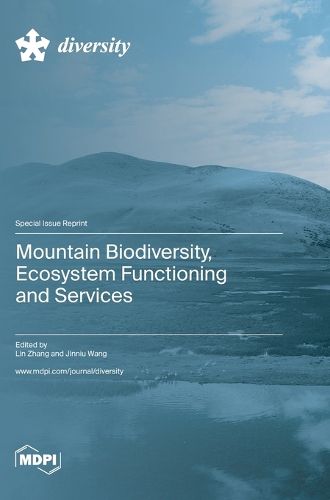Readings Newsletter
Become a Readings Member to make your shopping experience even easier.
Sign in or sign up for free!
You’re not far away from qualifying for FREE standard shipping within Australia
You’ve qualified for FREE standard shipping within Australia
The cart is loading…






This title is printed to order. This book may have been self-published. If so, we cannot guarantee the quality of the content. In the main most books will have gone through the editing process however some may not. We therefore suggest that you be aware of this before ordering this book. If in doubt check either the author or publisher’s details as we are unable to accept any returns unless they are faulty. Please contact us if you have any questions.
Mountains encompass more than 30% of all land and 23% of the Earth's forests, with high levels of biodiversity and endemism, and they support diverse habitats and refuges for approximately 85% of amphibian, bird, and mammal species. More than 1/4 of the global human population inhabits mountain environments, many of whom are among the world's poorest people. The climate and anthropogenic changes have had a tremendous impact on biodiversity and ecosystems around the world. On the Qinghai-Xizang Plateau, which is characterized by a low temperature, short growing season, and diverse ecosystems, global changes such as the warming climate might reduce biodiversity and alter ecosystem functions. This reprint contains studies with a focus on the Qinghai-Xizang Plateau and the south-west mountainous areas of China. The topic deals with the application of multiscale methods and approaches in the context of biodiversity, from the scale of genes and individuals to ecosystems and landscapes, including the adaptations of organisms, like plants, birds, and micro-organisms, spatial-temporal variations in vegetation patterns and land use statuses, and the possible driving factors of the functional adaptation of organisms to climate and anthropogenic changes.
$9.00 standard shipping within Australia
FREE standard shipping within Australia for orders over $100.00
Express & International shipping calculated at checkout
This title is printed to order. This book may have been self-published. If so, we cannot guarantee the quality of the content. In the main most books will have gone through the editing process however some may not. We therefore suggest that you be aware of this before ordering this book. If in doubt check either the author or publisher’s details as we are unable to accept any returns unless they are faulty. Please contact us if you have any questions.
Mountains encompass more than 30% of all land and 23% of the Earth's forests, with high levels of biodiversity and endemism, and they support diverse habitats and refuges for approximately 85% of amphibian, bird, and mammal species. More than 1/4 of the global human population inhabits mountain environments, many of whom are among the world's poorest people. The climate and anthropogenic changes have had a tremendous impact on biodiversity and ecosystems around the world. On the Qinghai-Xizang Plateau, which is characterized by a low temperature, short growing season, and diverse ecosystems, global changes such as the warming climate might reduce biodiversity and alter ecosystem functions. This reprint contains studies with a focus on the Qinghai-Xizang Plateau and the south-west mountainous areas of China. The topic deals with the application of multiscale methods and approaches in the context of biodiversity, from the scale of genes and individuals to ecosystems and landscapes, including the adaptations of organisms, like plants, birds, and micro-organisms, spatial-temporal variations in vegetation patterns and land use statuses, and the possible driving factors of the functional adaptation of organisms to climate and anthropogenic changes.